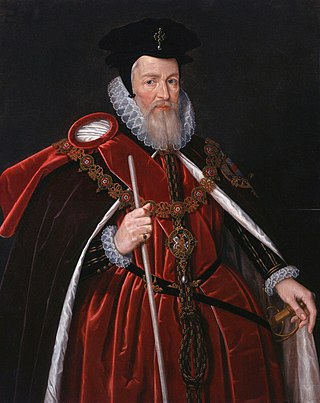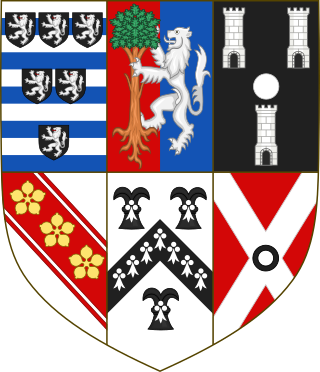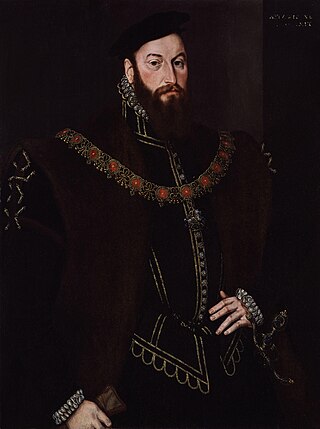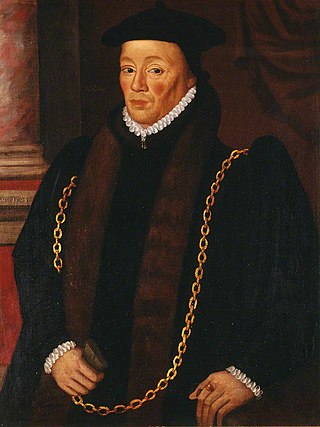Related Research Articles

Robert Dudley, 1st Earl of Leicester, was an English statesman and the favourite of Elizabeth I from her accession until his death. He was a suitor for the queen's hand for many years.

Sir Francis Walsingham was principal secretary to Queen Elizabeth I of England from 20 December 1573 until his death and is popularly remembered as her "spymaster".

William Cecil, 1st Baron Burghley was an English statesman, the chief adviser of Queen Elizabeth I for most of her reign, twice Secretary of State and Lord High Treasurer from 1572. In his description in the Encyclopædia Britannica Eleventh Edition, A.F. Pollard wrote, "From 1558 for forty years the biography of Cecil is almost indistinguishable from that of Elizabeth and from the history of England."

The Ridolfi plot was a Roman Catholic plot in 1571 to assassinate Queen Elizabeth I of England and replace her with Mary, Queen of Scots. The plot was hatched and planned by Roberto Ridolfi, an international banker who was able to travel between Brussels, Rome and Madrid to gather support without attracting too much suspicion.

Thomas Howard, 4th Duke of Norfolk, was an English nobleman and politician. He was a second cousin of Queen Elizabeth I and held many high offices during the earlier part of her reign.

Marquess of Exeter is a title that has been created twice, once in the Peerage of England and once in the Peerage of the United Kingdom. The first creation came in the Peerage of England in 1525 for Henry Courtenay, 2nd Earl of Devon. For more information on this creation, which was forfeited in 1538, see Earl of Devon.

Sir William Brooke, 10th Baron Cobham, KG, lord of the Manor of Cobham, Kent, was Lord Warden of the Cinque Ports, and a member of parliament for Hythe. Although he was viewed by some as a religious radical during the Somerset Protectorate, he entertained Queen Elizabeth I of England at Cobham Hall in 1559, signalling his acceptance of the moderate regime.

William Cecil, 2nd Earl of Exeter,, known as the third Lord Burghley from 1605 to 1623, was an English nobleman, politician, and peer.

Anthony Browne, 1st Viscount Montagu, KB, PC was an English peer during the Tudor period. He was a staunch Roman Catholic, but unswervingly loyal to the Crown. Montagu was employed on diplomatic missions to the Pope in Rome and to Spain, and was 'highly esteemed for his prudence and wisdom' by Queen Elizabeth. In spite of his bold opposition to the Acts of Supremacy and Allegiance, which threatened the religious activities of the Roman Catholics, he never lost Queen Elizabeth's favour. He was one of the commissioners who tried Mary, Queen of Scots in 1587. In 1571 he was implicated in the Ridolfi Plot.
Thomas Randolph (1523–1590) was an English ambassador serving Elizabeth I of England. Most of his professional life he spent in Scotland at the courts of Mary, Queen of Scots, and her son James VI. While in Scotland, he was embroiled in marriage projects and several upheavals. In 1568-1569 he was sent on a special embassy to Russia, visiting the court of Ivan the Terrible.

The Marshalsea (1373–1842) was a notorious prison in Southwark, just south of the River Thames. Although it housed a variety of prisoners—including men accused of crimes at sea and political figures charged with sedition—it became known, in particular, for its incarceration of the poorest of London's debtors. Over half the population of England's prisoners in the 18th century were in jail because of debt.

Rev. John Lloyd DCL (1533-1607) was a Welsh lawyer, Judge of the High Court of Admiralty in London, board member of All Souls College, and a cofounder, along with Queen Elizabeth Tudor, of the first Protestant College at the University of Oxford.
Sir Henry Killigrew was a Cornish diplomat and an ambassador for the Kingdom of England in the sixteenth century. He was several times employed by Elizabeth I in Scottish affairs and served as one of the English appointees to the Council of State of the Netherlands in the United Provinces in 1586 and 1587–1589. He served as a Member of Parliament for Newport & Launceston in 1553, for Saltash in 1563, and for Truro in 1571–2.
Sir Christopher Perkins was an English Jesuit turned diplomat and MP.

Sir William Garrard (1518–1571), also Garrett, Gerrarde, etc., was a Tudor magnate of London, a merchant citizen in the Worshipful Company of Haberdashers, who became alderman, Sheriff (1552–1553) and Lord Mayor of London (1555–1556) and was returned as an MP for the City of London. He was a senior founding officer of the Company of Merchant Adventurers to New Lands in 1554/55, having been involved in its enterprises since the beginnings in King Edward VI's time, and for the last decade of his life was one of its permanent governors. He worked hard and invested largely to expand English overseas trade not only to Russia and the Levant but also to the Barbary Coast and to West Africa and Guinea.

Anne de Vere, Countess of Oxford was the daughter of the statesman William Cecil, 1st Baron Burghley, chief adviser to Queen Elizabeth I of England, and the translator Mildred Cooke. In 1571 she became the first wife of Edward de Vere, 17th Earl of Oxford. She served as a Maid of Honour to Queen Elizabeth before her marriage.
Guerau de Espés del Valle was a Spanish nobleman and diplomat. He served as Philip II of Spain's ambassador to Elizabeth I of England from 1568 to 1571 during one of the tensest moments in Anglo-Spanish relations and was expelled after being accused of complicity of the Ridolfi plot. He was a knight of the Order of Calatrava. He also appeared as a character in the 2007 film Elizabeth: The Golden Age, played by the British actor Will Houston.
Charles Baillie, or Bailly (1542–1625), was a Fleming by birth, but a Scot by descent. He was a papal agent and member of the household of Mary, Queen of Scots, following the murder of her husband. Having the mastery of several European languages he was, after Mary's imprisonment, employed in carrying out foreign plots on her behalf.

Mildred Cecil, Baroness Burghley was an English noblewoman and translator in the sixteenth century. She was the wife of William Cecil, 1st Baron Burghley, the most trusted adviser of Elizabeth I, and the mother of Robert Cecil, 1st Earl of Salisbury, adviser to James I.
John Garbrand or Herks (1542–1589) was an English cleric, a prebendary of Salisbury Cathedral and friend of Bishop Jewell.
